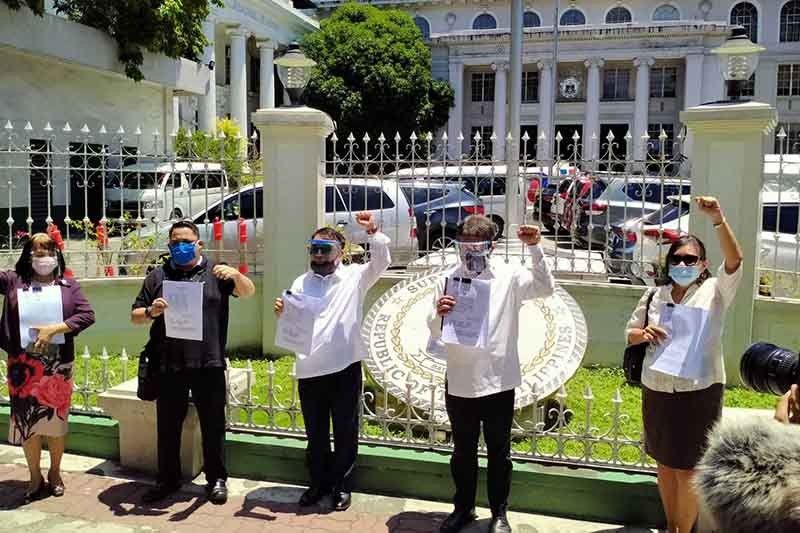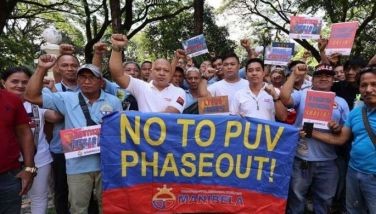Lawmakers join academe in assailing anti-terrorism law before SC

MANILA, Philippines — Lawmakers joined the law academe in challenging the constitutionality of the Anti-Terrorism Act of 2020 before the Supreme Court.
Rep. Edcel Lagman (Albay), also a veteran lawyer, was the second petitioner and the first lawmaker to assail the constitutionality of the Anti-Terrorism Act of 2020.
Six representatives under the Makabayan bloc, led by House Deputy Minority Leader Carlos Zarate (Bayan Muna party-list), also filed a petition citing the incidents where they were “victims of terrorist-tagging by State forces.” They were the fourth to assail the recently signed law.
READ: As soon as SC opens, law professors fire petitions vs anti-terrorism law
Unlike other petitions that assailed several provisions of the law, Lagman and the Makabayan bloc wanted the SC to strike down the entire Anti-Terrorism Act of 2020 as unconstitutional for being replete with constitutional infirmities.
“It was crafted in imprecise and vague language so much so that there is no certitude as to what acts the law actually prescribes, thus leaving citizens perplexed on what to avoid doing, even as its vagueness is conducive to conflicting interpretations and arbitrary enforcement,” Lagman said in his 55-paged petition filed Monday morning.
Lagman and the representatives of the Makabayan bloc voted no to the passage of the anti-terrorism bill when his colleagues at the House of Representatives approved the proposed legislation that President Rodrigo Duterte had marked as urgent.
Lagman: ‘Human Security Act’ was not a weak law
In his Petition for Certiorari, Lagman said: “[T]he war against suspected terrorists and the campaign against terrorism cannot be pursued and intensified by sacrificing human rights, civil liberties and fundamental freedoms which are enshrined in and protected by the Constitution.”
The Anti-Terrorism Act of 2020 effectively repealed the Human Security Act of 2007, which authors of the new anti-terrorism law said was a dead letter law.
But Lagman argued that the HSA had no deficiency. “The weakness is in the enforcement of the law,” he said.
Sen. Ronald Dela Rosa, former top cop, cited the release of an alleged ISIS international terrorist in compliance to the three-day detention allowed by the HSA to defend the 14-24 day detention without warrant in the new law. But Lagman said that this was not due to the inadequacy of HSA, but “rather to the ineptness of military and police intelligence.”
Lagman also stressed that the long period of detention “is conducive to the person detained being tortured or coerced into involuntary confession by law enforcers, notwithstanding motherhood declarations of safeguards. Moreover, prolonged interrogation amounts to mental/psychological torture under the “Anti-Torture Act of 2009.”
The lawmaker also assailed the criminalization and punishment of “threat”, “proposal”, and “inciting” to commit terrorism, as this “effectively restrains people from exercising their freedom of speech to seek redress of grievances and criticize the government and its officials for fear that their expression of contrary opinion and legitimate dissent, even outrage, will be considered criminal acts for which they can be jailed for 12 long years.”
Makabayan bloc: Red baiting and other chilling effects
The Makabayan bloc representatives, in their petition, argued that the vague definition of “terrorism” and lack of definition of “nature and context” of a terrorist act would allow law implementers “unbridled discretion to select the targets of the new terror law.”
The lawmakers noted that even before the anti-terrorism law was signed, law implementers have branded them as “terrorists”. Artists, academics, rights lawyers and workers, and media practitioners, too, have been accused of links to communist groups and of being “destabilizers.”
RELATED: Makabayan solons file case vs military execs over red-tagging, electioneering
“In this case, the dangerous and treacherous character of the term ‘terrorism’ becomes apparent, considering the pervasive practice of red-tagging, terrorist-tagging and vilification against activists, dissenters and the political opposition,” their petition read.
Red-tagging is defined by Philippine jurisprudence as “the act of labelling, branding, naming and accusing individuals and/or organizations of being left-leaning, subversives, communists or terrorists (used as) a strategy... by State agents, particularly law enforcement agencies and the military, against those perceived to be ‘threats’ or ‘enemies of the State.’”
The Anti-Terrorism Council is composed of Cabinet officials, some of whom are retired military officials who have a history of “red-tagging” or labelling activists, right workers and journalists as either rebel supporters or rebels themselves.
The lawmakers added that due to the vagueness of the law, “there will undeniably be instances where Filipinos will not know where social advocacy ends and ‘terrorism’ begins.”
“They will not see the line between academic or political thought and discourse, on one hand, and “terrorism,” on the other. This is the chilling consequence presented by the vague Anti-Terrorism Act of 2020,” they added.
The Makabayan bloc's petition is definitely not the last legal challenge against the Anti-Terrorism Act of 2020, as other lawmakers and members of the Philippine Bar, including retired SC Senior Associate Justice Antonio Carpio vowed to exhaust all legal remedies to fight the contentious new law.
President Rodrigo Duterte signed the Anti-Terrorism Law on July 3 despite opposition from rights groups and civil society groups that it could be used to stifle human rights.
A petition against the law has been filed at the Supreme Court and other groups are preparing pleadings of their own.
Follow this page for updates. Photo courtesy of The STAR/Michael Varcas
National Security Adviser Hermogenes Esperon moves to block access to several websites, including news sites of alternative news orrganizations Bulatlat.com and Pinoyweekly.org.
In his letter to the National Telecommunications Commission, he only says the websites are "affiliated to and are supporting these terrorists and terrorist organizations."
No other basis to back up his allegation was cited in the letter.
Citing the designation of the CPP-NPA-NDF as terrorists, NSA Hermogenes Esperon moves to block access to several sites.
— Kristine Patag (@kristinepatag) June 22, 2022
In Esperon's letter to the NTC, he included news sites @bulatlat and @pinoyweekly; sites of other progressive groups RMP and Save our Schools. @PhilstarNews pic.twitter.com/nAzMITJFsS
The Commission on Human Rights says it "partly welcomes" the Supreme Court decision that some parts of the controversial Anti-terrorism Law are unconstitutional.
CHR spokesperson Jacqueline de Guia says the commission remains hopeful that the remaining contentious provisions of the law will be clarified by the high cour in the full text of the decision.
"At the same time, our commitment remains in guarding against possible human rights violations arising from the implementation of the anti-terror law. We steadfastly remind the government that countering terrorism and protecting human rights are not competing values but are, in fact, mutual and complementary," De Guia says in a statement.
The Supreme Court has deliberated and voted on the controversial Anti-Terrorism Act but the decision will be released "at the soonest time possible."
"However, considering that there were numerous issues resolved in the case, as well as the fact that each Justice had to vote on each issue, there is a need to accurately confirm and tally the vote of each Justice in order to ensure the correct resolution of the Court per issue," SC spokesperson Brian Hosaka says.
The Anti-Terrorism Council designates the National Democratic Front of the Philippines, the panel that negotiates for communist rebels during peace talks a terrorist organization.
Previous designation of the Communist Party of the Philippines and New People's Army led to the designation of supposed members of the CPP's Central Committee. Among those designated as terorrists were peace consultants.
Designation gives the Anti-Terrorism Council the authority to investigate and freeze the accounts of designated persons.
The Anti-Terrorism Council has designated 29 people, including alleged members of the Communist Party of the Philippines-New People's Army, as terrorists in two resolutions.
Designation allows the Anti-Money Laundering Council to freeze the assets of those on the list.
- Latest
- Trending
































